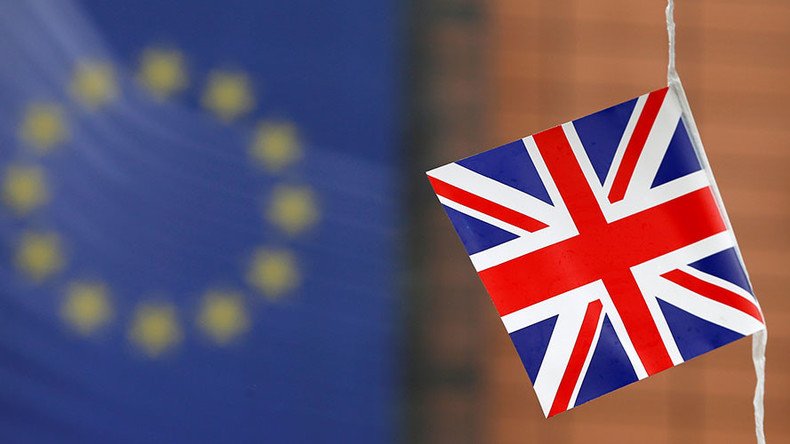Brexit would have stark consequences for UK, global economy - OECD

A Brexit would rattle Britain’s economy and the global financial system at large, creating the kind of economic turbulence one might expect following a Chinese financial crash, the Organization for Economic Cooperation and Development (OECD) has said.
In its latest economic forecast, the Paris-based think tank warned Brexit fears have already undermined economic progress in the UK.
The OECD report unveiled slashed forecasts for UK economic growth and warned there could be worldwide financial turmoil in the face of a Brexit.
Environmental issues left behind as Brexit rhetoric intensifies: https://t.co/cMakcbU5Yb via @FT
— Ann Pettifor (@AnnPettifor) June 1, 2016
The think tank reduced its projection for UK growth in 2016 to 1.7 percent, down from 2.2 percent in February. It also warned that policy uncertainty has risen, investment growth has fallen and confidence in Britain’s business sector has eased in the run-up to Britain’s EU referendum.
‘Stark short-term consequences’
The OECD’s analysis argues a Brexit would have stark short-term consequences for Britain. It predicted a vote to leave the EU would bolster uncertainty and spark a drop in asset prices, pushing households and businesses to cut spending in the face of an economic downturn.
While the OECD’s report said a sharp reduction in the value of the pound could ease these effects, it warned US inflation would rise and other EU economies would suffer in the process.
Global #economy stuck in low-growth trap; govts need to act to keep promises https://t.co/Ie5iQMp035#OECDwk Outlook pic.twitter.com/Mu9iLNIkDV
— OECD (@OECD) June 1, 2016
The OECD’s forecast predicts a Brexit would cause a “substantial shock to trade,” heralding a new era for Britain that would see significant barriers to market access for exporters. It also claimed gross domestic product (GDP) in Britain would plunge by 3 percent if the UK exits the EU, while GDP across the EU on average would drop by 1 percent.
In the longer term, the think tank said a restricted trade regime would hamper economic productivity and dynamism, causing foreign investment to drop. It suggested UK GDP could drop by 5 percent by 2020 following a Brexit.
Pro-Brexit campaigners dismissed the OECD’s analysis as biased, while Labour’s Shadow Chancellor John McDonnell said it lays bare the failure of Chancellor George Osborne’s economic policies.
“With the OECD forecasting a dramatic shock to the whole economy from a Tory Brexit, it’s clear we can’t risk failed Tory economic policy anymore,” he said.
“We need a serious commitment from this government to invest in infrastructure and housing, backed up by a real industrial strategy to place the economy on a sound foundation and build the high-tech, high-wage economy of the future.”
OECD report once again shows the absolute failure of the Chancellor’s economic policy @johnmcdonnellMPhttps://t.co/yR7Fzrv7wD
— Labour Press Team (@labourpress) June 1, 2016
McDonnell argued Britain’s so-called economic recovery “is built on sand.”
“Not only has productivity slumped, but the OECD also highlight the risk of further bubbles in the housing market whilst house building continues at too low a level,” he said.
‘Creature of government’
Bank of England (BoE) governor Mark Carney hit back at critics last week who branded his Brexit warnings biased. Carney rebutted remarks from pro-Brexit Tory MPs Jacob Rees-Mogg and Steve Baker that the central bank was wrong to cast judgment on the economic impacts of a UK departure from the EU.
Rees-Mogg, who had previously called for Carney’s resignation over his anti-Brexit rhetoric, said the bank is a “creature of government” and had caved to pressure from Osborne to play up Brexit risks and soften possible benefits of leaving the EU. Baker was also critical, accusing the BoE of peddling flawed economic analysis.
First up today - Zombies
— Johnna Montgomerie (@j_montgomerie) May 19, 2016
Dead ideas, dead business models and the post crash economy. #ZombieEconomypic.twitter.com/ByUs0CWhjx
As well as offering analysis on Britain’s EU referendum, the OECD’s report cast its lens across the global economy at large. It said the global financial system is locked in a “low growth trap” that demands a new policy path so that higher growth rates are achieved.
“Growth is flat in the advanced economies and has slowed in many of the emerging economies that have been the global locomotive since the crisis,” OECD Secretary-General Angel Gurría said while launching the report in Paris.
“Slower productivity growth and rising inequality pose further challenges. Comprehensive policy action is urgently needed to ensure that we get off this disappointing growth path and propel our economies to levels that will safeguard living standards for all.”












